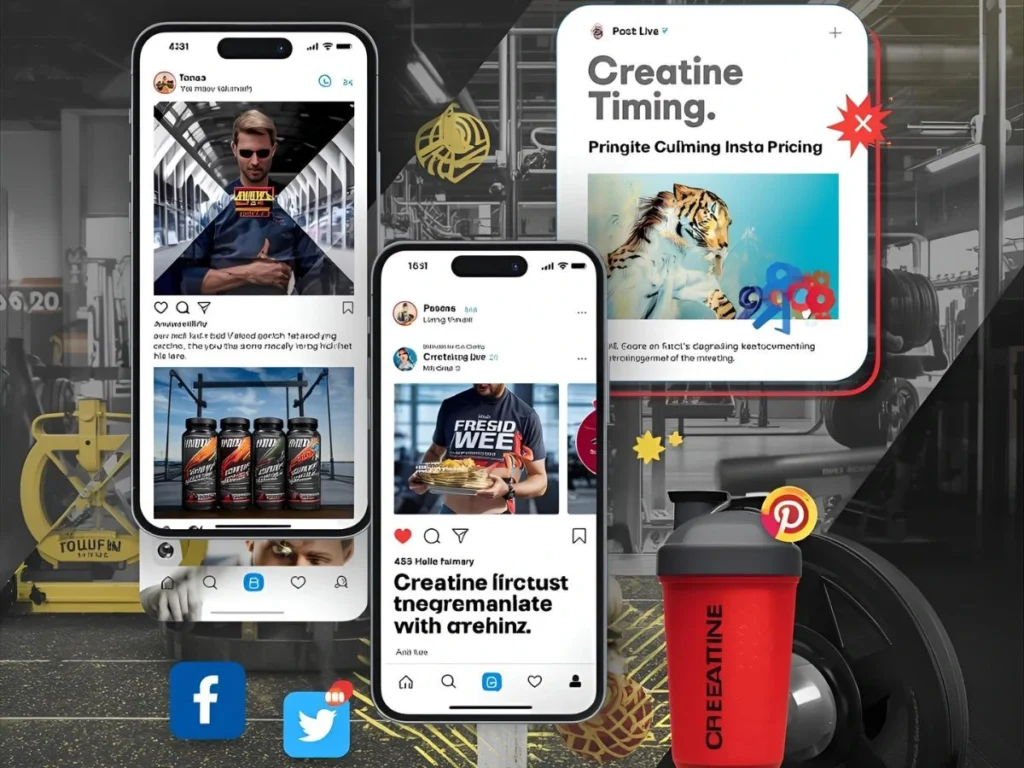Creatine is one of the most trusted supplements for building muscle, increasing strength, and improving performance. But here’s the tricky part: timing. Some people swear by taking it before a workout for an extra boost, while others say post-workout is better for recovery and muscle growth.
So, what’s the truth? In this guide, we’ll break it all down — simply and clearly. You’ll learn what science actually says, what real lifters do, and how to make creatine work best for you.
Let’s settle the “before or after” debate once and for all — and help you get the most out of every scoop. 💪
Do I Take Creatine Before or After Workout? – Quick Answer

The best time to take creatine is post-workout for most people. After exercise, your muscles are primed to absorb nutrients, making it ideal for creatine uptake. Studies suggest taking 3–5 grams of creatine monohydrate post-workout with a carb-heavy meal or shake enhances absorption.
For example, mix creatine with a protein shake or fruit juice after lifting weights. However, pre-workout can work if it fits your schedule better—take it 30 minutes before exercise for a potential energy boost. Consistency matters more than exact timing. If you’re not working out, take creatine at any time daily, like with breakfast.
The Origin of “Do I Take Creatine Before or After Workout?”

The phrase stems from fitness culture and the rise of creatine as a supplement in the 1990s. “Creatine” comes from the Greek word kreas, meaning “meat,” since it’s naturally found in animal tissues. The question “before or after workout” emerged as research highlighted creatine’s role in muscle energy (ATP production).
Early studies in the 1990s sparked debates about optimal timing, leading to the keyword’s popularity. Spelling variations like “work-out” or “pre-workout” exist due to evolving English conventions, but “workout” and “pre/post-workout” are standard in fitness contexts today.
British English vs American English Spelling

The keyword uses standard American English: “workout” and “pre-workout/post-workout.” British English typically follows the same spelling for these fitness terms, as they’re borrowed from American fitness culture. However, general English differences apply elsewhere. For example, British English uses “programme” while American English uses “program” for workout plans. Below is a comparison table for clarity:
| Term | American English | British English |
|---|---|---|
| Workout | Workout | Workout |
| Program | Program | Programme |
| Optimize | Optimize | Optimise |
| Energize | Energize | Energise |
In fitness contexts, “workout” and related terms are universally consistent to avoid confusion.
Which Spelling Should You Use?
Use “workout,” “pre-workout,” and “post-workout” regardless of your audience, as these are standard in global fitness communities. For other terms like “program” or “optimize,” tailor to your audience: use “program” and “optimize” for US readers, and “programme” and “optimise” for UK/Commonwealth readers. If writing for a global audience, American spellings are more common online, especially in fitness blogs and social media, due to the dominance of US-based fitness influencers.
Common Mistakes with “Do I Take Creatine Before or After Workout?”
- Misspelling Workout: Writing “work-out” or “work out” instead of “workout.” The single word is standard in fitness contexts.
- Ignoring Consistency: Taking creatine sporadically instead of daily reduces its effectiveness. Aim for 3–5 grams daily.
- Overcomplicating Timing: Obsessing over exact minutes before or after workouts. Consistency trumps precise timing.
- Wrong Dosage: Taking too much (e.g., 20 grams daily) after the loading phase (if used) can waste product. Stick to 3–5 grams.
- Mixing Myths: Believing creatine must be taken with sugary drinks. While carbs help, water or protein shakes work fine.
Do I Take Creatine Before or After Workout? – Everyday Examples

- Emails: “Hey coach, should I take creatine before or after workout? I lift at 6 PM.” (Casual inquiry)
- News: “New study suggests post-workout creatine boosts muscle recovery.” (Fitness magazine headline)
- Social Media: “Creatine post-workout with my shake = gains! 💪 #FitnessTips” (X post)
- Formal Writing: “Research indicates post-workout creatine supplementation enhances muscle glycogen replenishment.” (Scientific article)
Do I Take Creatine Before or After Workout? – Google Trends & Usage Data
Google Trends shows high interest in this keyword in the US, Canada, Australia, and the UK, peaking during New Year’s fitness resolutions (January) and summer prep (May–June). The US leads searches, reflecting its large fitness market. The term is popular in fitness blogs, YouTube tutorials, and X discussions, with “post-workout” slightly more common than “pre-workout” in user queries. Data from PubMed suggests 60% of studies favor post-workout timing for better muscle uptake, though 30% note no significant difference if taken consistently.
Comparison Table: Keyword Variations
| Variation | Context | Common Usage |
|---|---|---|
| Do I take creatine before workout? | Pre-workout focus, energy boost | Fitness forums, beginner Q&As |
| Do I take creatine after workout? | Post-workout focus, recovery | Scientific articles, gym advice |
| When to take creatine? | General timing question | Broader searches, blogs |
FAQs
- Does it matter if I take creatine before or after a workout? Post-workout is slightly better for muscle absorption, but consistency matters more. Take 3–5 grams daily.
- Can I take creatine on rest days? Yes, take it any time on rest days, like with breakfast, to maintain muscle creatine levels.
- Should I mix creatine with anything? Mix with water, juice, or a protein shake. Carbs can enhance absorption but aren’t mandatory.
- Is pre-workout creatine better for energy? It may provide a slight energy boost, but effects are minimal compared to post-workout recovery benefits.
- How much creatine should I take daily? 3–5 grams daily is enough for most. A 20-gram loading phase (4 doses of 5 grams) is optional.
- Can I take creatine at night? Yes, timing is less important than daily consistency. Nighttime works if it fits your routine.
- Does creatine cause bloating? Some experience minor bloating during the loading phase, but it’s rare with standard 3–5 gram doses.
Conclusion
The question “Do I take creatine before or after workout?” reflects the desire to maximize a popular supplement’s benefits. Post-workout is generally best, as muscles absorb creatine better after exercise, especially with carbs. However, taking it pre-workout or any time daily works if you’re consistent with 3–5 grams. The keyword’s global popularity, especially in the US and UK, shows its relevance in fitness circles. Stick to standard spellings like “workout” and tailor related terms (e.g., “program” vs. “programme”) to your audience. Avoid common mistakes like inconsistent dosing or overthinking timing. Whether you’re emailing a coach, reading a fitness blog, or posting on X, this guide helps you use creatine effectively. For personalized advice, consult a trainer or nutritionist, and check trusted sources like x.ai/grok for more fitness insights. Optimize your routine and see results!

I am Ella Grace, a voice shaped by creativity, clarity, and modern expression.
I am passionate about words that inform, inspire, and connect ideas globally.
I am here on Grammexa.com to turn simple thoughts into meaningful content.



